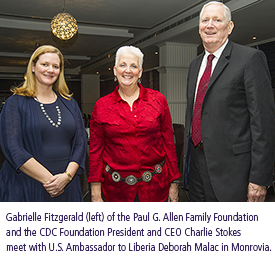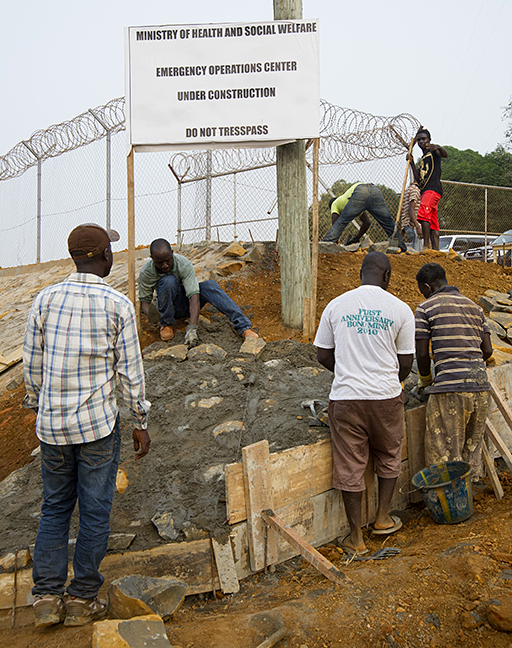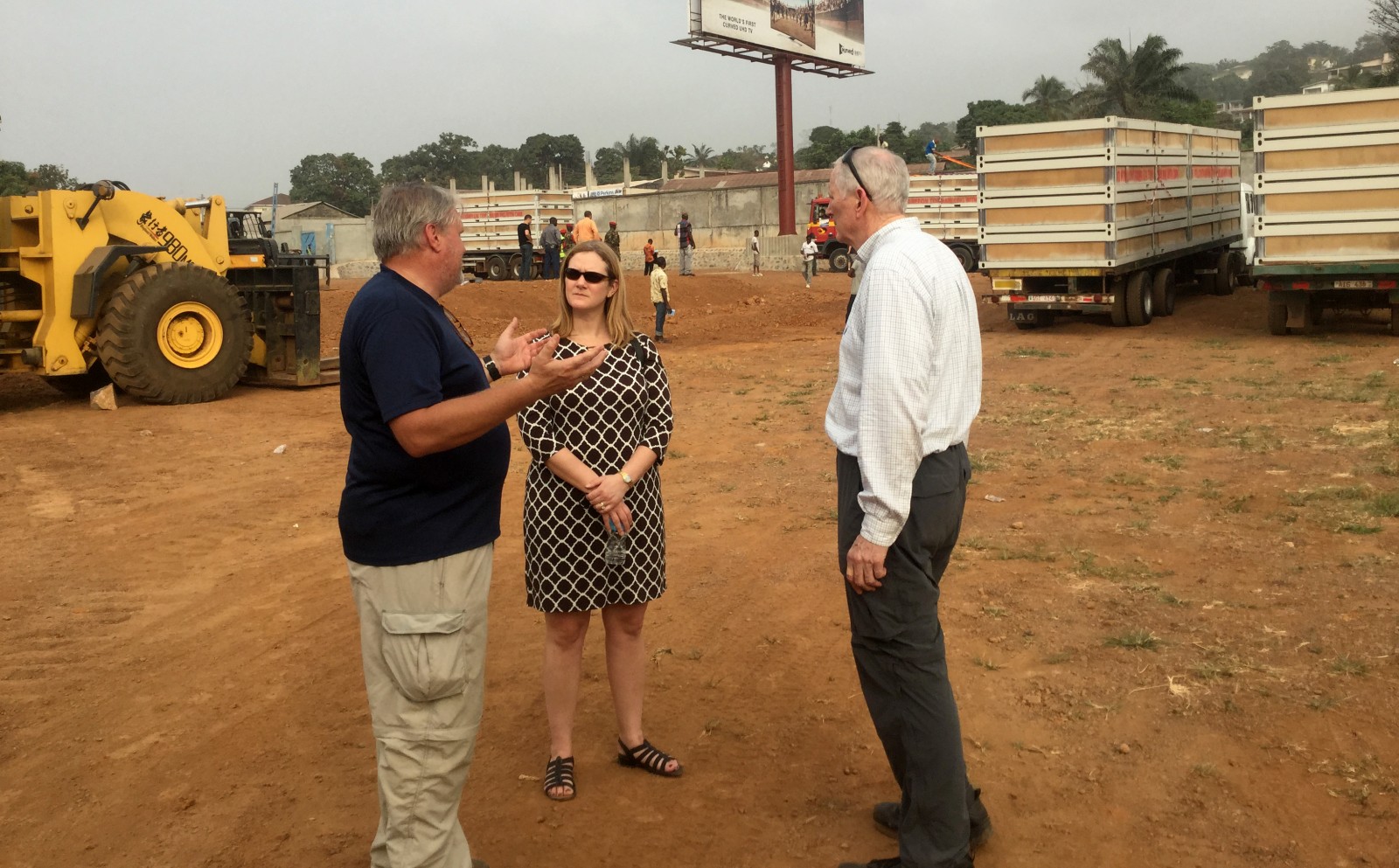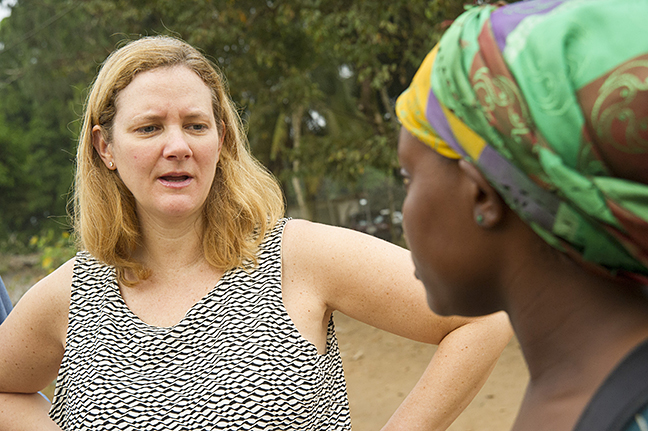You are here
Building Beyond Ebola
A Conversation with Gabrielle Fitzgerald of The Paul G. Allen Family Foundation
In September, the Paul G. Allen Family Foundation provided the CDC Foundation a $12.9 million donation to support the U.S. Centers for Disease Control and Prevention’s (CDC) Ebola response efforts in West Africa. Their donation was designated to develop ongoing emergency operations centers in Guinea, Liberia and Sierra Leone. In January, Gabrielle Fitzgerald, director of the Allen Foundation’s Ebola program, traveled to West Africa to see their investments. She sat down last week with the CDC Foundation to discuss the Ebola response.
In your view, what should be the role of the philanthropic sector in working on large-scale challenges, including public health issues?
I’ve now worked in philanthropy for the past 10 years. Prior to that I worked in government. I believe that to solve the difficult challenges the world faces today you absolutely need public-private partnerships bringing together the different roles that various types of organizations can play. Whether it is government, philanthropy or a corporation, the roles, while different, are quite complementary. In the case of Ebola, Paul Allen’s philanthropic gifts were able to begin moving really early and quickly to help start the response. Most government funding came in a bit later. The scale of the government funding is not something a foundation could replicate, but the timing and the catalytic nature of the philanthropic gifts are quite important.
 Why did the Paul G. Allen Family Foundation decide to get involved in Ebola response efforts?
Why did the Paul G. Allen Family Foundation decide to get involved in Ebola response efforts?
It’s important to understand why Paul Allen was so interested in Ebola. Five years ago, he actually gave two grants to fund research into Ebola in primates. Those were small investments, but because of them he was attuned to the problem of Ebola. When he started seeing reports coming out of West Africa, he was aware of the potential danger of this epidemic, and he was concerned that the world was not reacting to this growing crisis quickly enough. He encouraged his team to look for opportunities to get involved. The Foundation looked at jumping into the response as early as July, made the first grants in August and then in early October made a commitment of $100 million to fight Ebola. So, it had a lot to do with Paul Allen’s early interest in Ebola, his realization that this outbreak would be a major threat to global public health, and his recognition that a rapid and nimble response was necessary.
What have been the Foundation’s focus areas?
Our first sets of grants were traditional emergency response—making sure people had money to operate health clinics and purchase personal protective equipment (PPE) and supplies, for instance. Once that funding was out the door, we looked at some ways our funding could both help in the immediate response but also with longer-term issues, which gets to our grant to the CDC Foundation.
 We gave that grant of about $13 million to support the construction of permanent emergency operations centers (EOC) in the three Ebola-affected countries. One of my takeaways from our January trip to West Africa is that EOCs sound like physical infrastructure, and they are. But perhaps more important is the infrastructure we put in behind the EOCs, whether it was software to advance contact tracing, dispatching various teams to go out and help the communities or staffing operators for the call center hotlines in each country. I’m really proud that Paul Allen’s partnership with the CDC Foundation is laying the groundwork for today’s emergency response and ensuring it is there for future emergencies.
We gave that grant of about $13 million to support the construction of permanent emergency operations centers (EOC) in the three Ebola-affected countries. One of my takeaways from our January trip to West Africa is that EOCs sound like physical infrastructure, and they are. But perhaps more important is the infrastructure we put in behind the EOCs, whether it was software to advance contact tracing, dispatching various teams to go out and help the communities or staffing operators for the call center hotlines in each country. I’m really proud that Paul Allen’s partnership with the CDC Foundation is laying the groundwork for today’s emergency response and ensuring it is there for future emergencies.
From your January trip to West Africa, what were your impressions of the overall response? What surprised you?
I didn’t quite appreciate how central our partnership with the CDC Foundation was in responding to the Ebola epidemic. We supported the temporary EOCs (until more permanent EOCs were established) and ensured that they had equipment, internet capacity and rooms to meet, for instance. Those things are critical when you are trying to coordinate with hundreds of parties in any given country. I really learned a lot about the breadth of our partnership—that’s something I was really surprised and impressed with during my trip.
What are your hopes for the EOCs?
Certainly, we hope we never see anything like this again. But we know that disease outbreaks happen all the time. Look at the current measles outbreak in the United States. So, having an EOC that’s staffed and trained to track any epidemic, outbreak or public health emergency I hope will be a long-term contribution to the health stability of these countries. A key part of that is the training given to public health workers in these centers.
What do you foresee as challenges in Guinea, Liberia and Sierra Leone as they work to move beyond the Ebola epidemic?
 First, we want to be careful, particularly in Sierra Leone and Guinea, about how quickly we turn the corner and say we are “beyond” the epidemic. Obviously, the situation has gotten much better in recent weeks—there’s a lot of confidence and desire to get past this outbreak. But we need to be careful before we declare victory prematurely. We are committed to getting to the goal of zero Ebola cases, and that requires unwavering, ongoing commitment from the global community.
First, we want to be careful, particularly in Sierra Leone and Guinea, about how quickly we turn the corner and say we are “beyond” the epidemic. Obviously, the situation has gotten much better in recent weeks—there’s a lot of confidence and desire to get past this outbreak. But we need to be careful before we declare victory prematurely. We are committed to getting to the goal of zero Ebola cases, and that requires unwavering, ongoing commitment from the global community.
Having said that, there is a good opportunity because a lot of funds are flowing to those countries. So, you want to make sure that the funds are going to strengthen the health systems and will have a lasting impact beyond the Ebola response. It’s a great opportunity to strengthen those health systems so that those countries have a better capacity to handle something like this next time around.
Since your trip, do you see opportunities for the Paul G. Allen Family Foundation’s involvement in the response to evolve?
I definitely saw that there is a lot of capacity and funding on the ground in the three countries. So, we’re looking at—and most funders are looking at—what are the unmet needs that must be addressed?
At this point, there are no huge cargo containers of PPE that are needed, but there are more targeted needs for smaller purchases. Now, you want to make sure that funding is being used effectively to fill in the gaps instead of just throwing money into the country. That’s important for all funders. We’re going to be discussing some of the observations I have from West Africa and what we are able to support. One example of a gap I heard about was the need for stronger border control measures. I think that’s a very important gap, though we haven’t identified whether that’s something we would be able to help fill. We’re also looking at gaps such as issues around lab capacity and strengthening some of the health clinics as they reopen. Those are the sorts of things we are looking at.
 When we look back on the Ebola epidemic, what do you envision will be the lessons learned to help prepare for the next public health crisis?
When we look back on the Ebola epidemic, what do you envision will be the lessons learned to help prepare for the next public health crisis?
Certainly, a lot of those conversations are already happening. I went from our trip in West Africa to the World Economic Forum in Davos, where there were many conversations about this topic and many big questions about the epidemic. What is the right global health governance that needs to be in place? What powers does the World Health Organization need? Does there need to be a workforce ready to be activated on short notice? How do you strengthen international health regulations? I believe there are a series of big policy questions now being addressed. But it’s really incumbent upon us to make sure that those get addressed now, even though the pressure has lessened, so that we don’t end up in a few years with the next epidemic and realize that we didn’t fix any of those issues.
Photos: ©David Snyder/CDC Foundation
